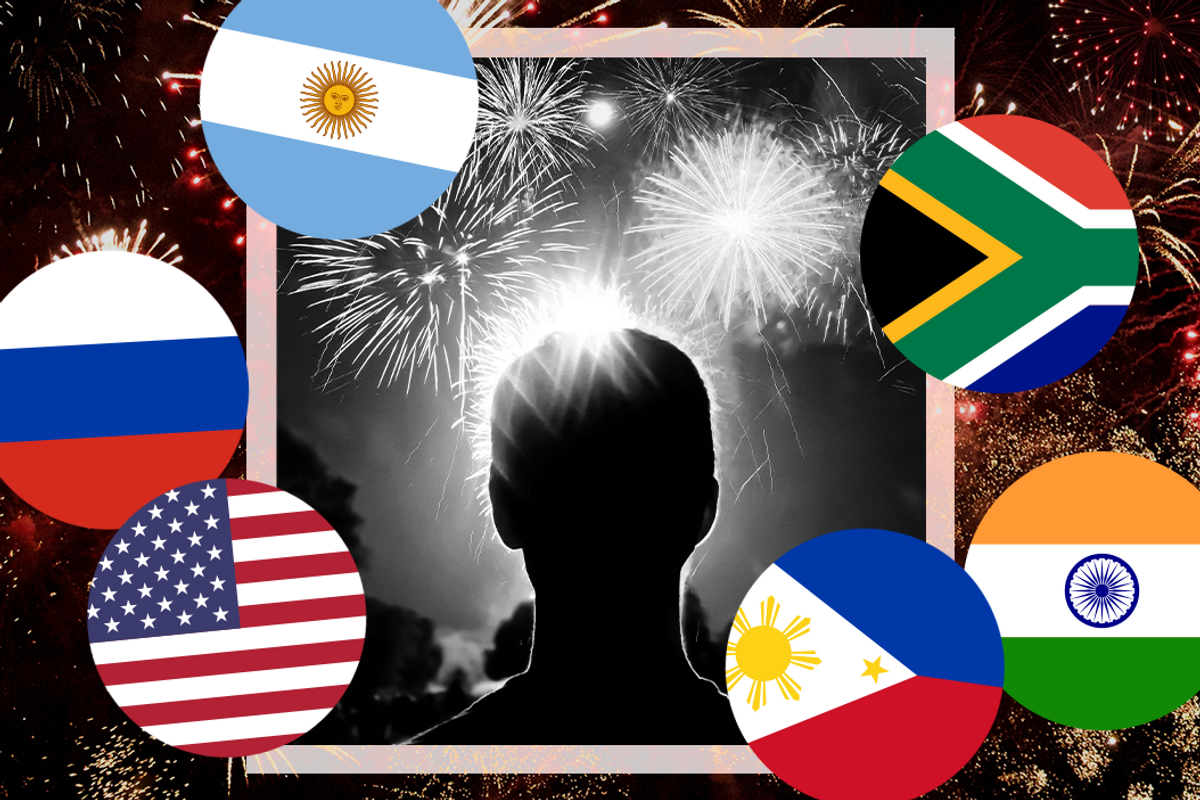When the United States celebrates its Independence Day on July 4th, many Americans will be singing the Star-Spangled Banner at sports games, parties, and other patriotic-themed events. To mark the date, we take a look at some fun facts about national anthems around the world.
1. Change it up.
Russia has had seven different national anthems throughout history. The current version is based on the Stalinist anthem of the USSR with slightly reworked lyrics, after Vladimir Putin scrapped the earlier post-Soviet wordless piano tune approved by his predecessor Boris Yeltsin. Putin himself loves to sing it — here's one of his most famous performances, in front of his supporters during the 2018 presidential election campaign.
2. Fix that typo.
The original 1813 version of Argentina's national anthem was somewhat perplexing: did the tune glorify the country's struggle for independence from Spain, or oppose it? The confusion was quickly resolved by removing an errant "o" to change the meaning of a phrase, making it clearer that the country did in fact support the war of liberation from the Spanish. It would have been much worse, obviously, if the lyrics had said nice things about Brazilians.
3. Write me a tune.
Rabindranath Tagore, who in 1913 became the first non-European to win the Nobel Prize in Literature, wrote the national anthems of his native Bangladesh as well as India's. Indian Prime Minister Narendra Modi once claimed that Tagore also composed Sri Lanka's national anthem, but some experts say there's no evidence of that beyond his deep musical influence on the writer of the tune.
4. Stand up — or else.
In some countries, not standing up for the national anthem is a criminal offense, like in Thailand. Sitting through the anthem, whose lyrics honor the Thai king, is a violation of the country's draconian laws that punish offenses against the monarchy with a maximum penalty of 15 years in prison. If you catch a movie in Bangkok, don't forget to stand up, as the anthem — with an accompanying royal family PR video clip — is played before all films.
5. Let's share.
The pan-African liberation song Nkosi Sikelel' iAfrika, the current national anthem of South Africa, was also used at different times by Namibia, Tanzania, Zambia, and Zimbabwe. It's a multi-lingual anthem sung in a total of five languages: Xhosa and Zulu (first stanza), Sesotho (second), Afrikaans (third), and English (fourth). Interestingly, the lyrics in the Afrikaans and English stanzas are taken from Die Stem, the apartheid-era anthem Nkosi Sikelel' iAfrika replaced when minority white rule ended in 1994.
6. Or let's split.
When Czechoslovakia was a united country, the first stanza of the national anthem was in Czech, and the second in Slovak. Following their split into two countries in 1993, the first stanza became the Czech anthem and the second the Slovak one, which explains why both are so short. Signalista Alex Kliment, who has Czech blood, tells us that the Czech tune begins by asking "Where is my home?" — while the Slovak one kicks off with a bang, invoking lightning striking over the Tatra mountains, but then quickly goes full emo about how the Slovak nation is sad and needs to be woken up from its slumber.
7. Don't have one — borrow someone else's.
Divided Cyprus has no official anthem, with the southern part of the island using Greece's — the longest in the world, with a whopping 158 verses — and the northern part adopting Turkey's. When the country joined the European Union in 2004, Cypriots from both sides rejected a wordless tune that the two factions had agreed on as part of a peace plan pushed by then-UN Secretary-General Kofi Annan.
8. Hum away.
Spain is the only country whose national anthem has no lyrics. Why? Because different Spanish regions couldn't agree on the words to replace the Franco-era ones, and few liked the result of a 2007 contest to come up with fresh lyrics. The Australian organizers of the Davis Cup tennis tournament couldn't believe it, and caused a minor diplomatic incident with Madrid in 2003, when they mistakenly played the wrong tune — a 1930s march from when Spain was briefly a republic — to the astonishment of the Spanish tennis players.
9. Don't get creative.
Music-obsessed Filipinos have very strict rules on how the country's national anthem must be played and performed. A 2017 law specifies that the proper rendition of Lupang Hinirang cannot deviate from the original musical arrangement and composition of writer Juan Felipe: "2/4 beat when played, within the range of 100 to 120 metronome, in 4/4 beat when sung." Straying away from the official melody can land you a hefty fine and up to a year in prison.
10. Rake it in.
As Signalista Willis Sparks reminds us, it took the US Congress an astounding 41 attempts to finally approve the Star-Spangled Banner as America's national anthem in 1931 — in part because Southern states complained it was the hymn of Union troops. It's considered the most commercially successful national anthem of all time, particularly the version performed by the late Whitney Houston at the 1991 Super Bowl weeks after the US victory over Iraq in the Gulf War. (Houston's rendition — commercialized to benefit the families of Gulf War vets — was re-released after 9/11, when it made the Top 10 and was certified platinum after selling more than two million copies.)

















